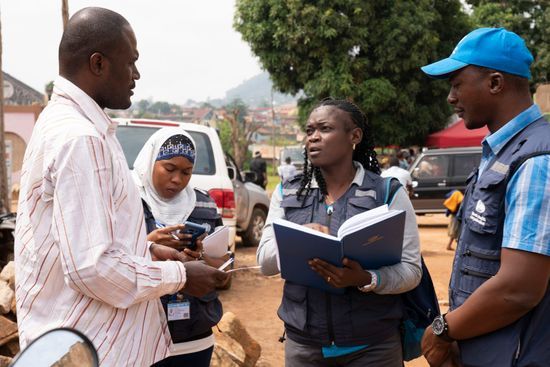
Ready4Response is a multi-tiered core curriculum that aims to develop consistent learning standards across the emergency response workforces at national level. It equips participants with essential competencies needed to work within public health emergency response.
The COVID-19 pandemic has highlighted that all countries are challenged in their abilities to respond to emergencies. Having access to the right people, with the right skills and training, at the right time and location is essential to saving lives and protecting the health of people, societies and economies during an emergency.
Tier 2 focuses on the Incident Management System (IMS) and its core functions. It also examines core skills required to work effectively in a response team and describes the basic principles of risk management.
Photo credit: WHO/C. Black
Language: English
English
Health topic
Course information
This course is also available in:
ພາສາລາວ - Français - العربية - Українська
Overview: Ready4Response aims to develop consistent learning standards across the emergency response workforce, equipping participants with essential competencies needed to work across the various levels of response. In Tier 2 you will learn about the Incident Management System (IMS), its core functions and various sub-functions. You will also learn about the core skills required to work effectively in a response team.
Learning objectives: By the end of Tier 2, you will be able to:
- describe the main functions, roles and outputs of the Incident Management System and how these are operationalized in the Emergency Operations Centre;
- describe principles for successful teamwork in a response context;
- describe a basic decision-making process; and
- describe a basic risk management process.
Course duration: Approximately 5 hours.
Certificate: A Record of Achievement certificate will be available to participants who score at least 80% of the total points available across all quizzes. Participants who receive a Record of Achievement can also download an Open Badge for this course. Click here to learn how.

Other Tiers of the Ready4Response core curriculum that are currently available can be accessed below:
Disclaimer: Please note that this course includes photographic depictions of emergency response scenarios prior to the outbreak of COVID-19. Please adhere to your local national guidelines on COVID-19 precautions, including physical distancing of at least 1 metre as well as appropriate usage of masks when indicated.
Course contents
Module 1: Response systems and structures:
This module consists of 4 units: introduction to systems and structures; policies, plans and procedures; the Incident Management System (IMS); and the Emergency Operation Centre (EOC).Module 2: The Incident Management System (IMS) core functions:
This module consists of 5 units: Incident Management; Operations; Planning; Logistics; and Finance and Administration.Module 3: Response core skills:
This module consists of 4 units: the OODA loop; working in a team: team dynamics; working in a team: managing conflict; and unconscious bias.
Enroll me for this course
Certificate Requirements
- Gain a Record of Achievement by earning at least 80% of the maximum number of points from all graded assignments.
- Gain an Open Badge by completing the course.